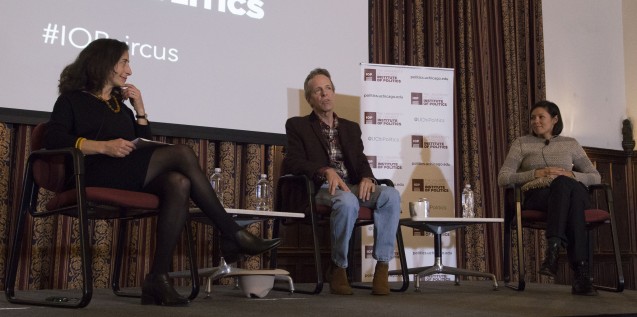On November 21, the Institute of Politics (IOP) hosted a panel with The Atlantic journalist Alex Wagner and producer and political strategist Mark McKinnon to discuss the 2016 presidential election and Showtime’s political documentary series The Circus: Inside the Greatest Political Show on Earth.
The Circus followed the candidates behind-the-scenes on the campaign trail, documenting “fascinating ecosystems of drama and characters and pain and humor,” McKinnon said. The show ran from January through November, airing every Sunday.
The show was partly inspired by Mitt, the documentary chronicling the presidential campaigns of Mitt Romney, which aired on Netflix after the 2012 election. McKinnon reported that the Romney team regretted not releasing the film before the election, since it captured a compelling personal side to the candidate often concealed to the public. McKinnon hoped The Circus provided voters with unprecedented intimate access to the candidates. “We wanted it to be in real time,” McKinnon said, because “that’s what makes good drama good, that [viewers didn’t] know how this story ends.”
Wagner described the surreal moments she covered on the campaign trail. She found herself alone with Ted Cruz right after he left the stage at the Republican National Convention, having declined to endorse Donald Trump.
“When you do something crazy, there’s a moment after you do the crazy thing where you’re like, shit, I just did that, and that expression was all over Ted Cruz’s face. I found myself in the middle of this insane moment…. Running down the hall with a look of panic on his face was Reince Priebus. It was amazing.”
Asked why polls and pundits failed to foresee Trump’s win, Wagner and McKinnon both ascribed it to the media’s lack of coverage of the voters themselves.
“There wasn’t a lot of anecdotal information of people out in the field,” Wagner said. She attributed journalists’ failure to cover popular support for the insurgent candidate in part to the economic pressures on print media, which are forcing even major newspapers to cut back on the number of journalists they send out to talk to voters in swing states.
McKinnon said that New York Post columnist Salena Zito was one of the few reporters consistently in the field talking to voters and was consequently correct in her assessment that the press and establishment took Trump “literally but not seriously, and his supporters took him seriously, but not literally.”
The panel played a clip from The Circus that captured the unease of a Republican establishment scrambling to make sense of Trump’s rise. Filmed in March, the footage shows party insiders—all white men—sipping martinis in business suits and dismissing the candidate.
“All he has going for him is a lot of votes,” Ed Rogers, a former adviser to the Reagan and Bush administrations, said.
“Turns out, that’s what you need,” Wagner said, to laughter.
Discussing why Trump won so many votes, Wagner described the current American cult of celebrity and “full-scale abandonment of nuance.”
“We look for oversized conflict, we look for binary propositions between good and evil, we look for clean resolution, and we look for characters. And turns out Hillary Clinton is none of those things,” she said.
The tone of audience questions was concerned and urgent. “Who is the arbiter of truth? How does the media gain back the public’s trust?” one audience member asked.
Wagner spoke about the recent proliferation of fake news through social media sites, and the confirmation bias that feeds it. “A reality has been established wherein you can live in a sort of cubbyhole of news, of information, of quote unquote ‘reality’ that is incredibly affirming. And that’s like a drug,” she said. She sees an uphill battle for mainstream news sources as they try to compete with increasingly popular sources of misinformation.
“I have a hard time understanding how in this day and age, we wean people off the drug of affirming information. And that’s super scary,” Wagner said.
The journalists were also asked about WikiLeaks’s influence in this campaign and its potential effects on future election cycles. Wagner spoke about the moral gray area of reporting on stolen information. “Initially, you saw some hand-wringing in the press about whether to cover it, but once it went through one, two days of the news cycle…it was open season.”
“I talked about John Podesta’s emails on camera, and I am to some degree ashamed that I did,” she said.
Extended clips of The Circus’s expository campaign coverage are available for free on its YouTube channel.









